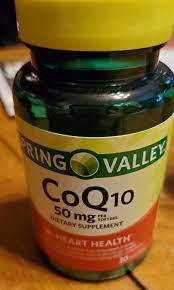The Cognitive Benefits of Starting a CoQ10 (Coenzyme Q10) Supplement Regimen

What You Should Know About CoQ10
CoQ10 is one of many new supplements on the market. Our knowledge of the human body's inner workings has led to new options regarding health and longevity.
CoQ10 is an antioxidant that the human body produces naturally.
CoQ10 not only wards off damage from free radicals but is also an essential factor in the body's underlying metabolic processes.
Though the human body can produce its own CoQ10, there is much evidence that CoQ10 supplementation can benefit many people.
As with Vitamin D, Testosterone, and Human Growth Hormone, the human body slowly loses its ability to produce adequate levels of CoQ10 as we grow older, meaning that older patients may benefit significantly from increased CoQ10 consumption through diet or supplementation.
There are also many health issues that can deplete reserves of natural CoQ10, such as depression, heart disease, and diabetes.

CoQ10 also has a tremendous risk-reward ratio for patients interested in the nutritional supplement because the side effects, if any, are incredibly mild, meaning that there's a negligible risk for most patients interested in adding additional CoQ10 to their routine.
Why Do People Take CoQ10?
Many doctors and wellness specialists recommend that their patients increase their CoQ10 consumption for various reasons. Patients are often advised to take CoQ10 as an aspect of their blood pressure maintenance, as CoQ10 can help bring elevated blood pressure down to a healthier range, especially when combined with other changes and treatments.
CoQ10 is often billed as an energy supplement or included in supplemental energy formulations. The supplement can provide additional energy for patients with low CoQ10 levels, but for patients with normal CoQ10 levels, these benefits are believed to be negligible.
Many doctors prescribe CoQ10 for patients struggling with cardiac conditions or heart failure because there is modest evidence that CoQ10 supplementation can help reduce the risk of major heart events. CoQ10 should never be considered an alternative to other medications but used in conjunction with them.
More research needs to be conducted, but CoQ10 may benefit patients taking statins to control their cholesterol. Some patients experience liver issues and muscle pain resulting from their statin regimen, and CoQ10 may provide some relief from these medical problems.
One area in which CoQ10 supplementation is particularly exciting is for the treatment of Alzheimer's Disease. This condition has ravaged the minds of millions of patients, and scientists are working hard to find effective means to treat the disease. CoQ10 may have the ability to slow down the advance of Alzheimer's Disease.
CoQ10 is also a candidate for treating a range of other medical ailments. For example, CoQ10 may help prevent or reduce the frequency of migraine headaches. Researchers are also surveying CoQ10 for potential benefits for gum disease, Parkinson's, muscular dystrophy, HIV, cancer, and more.
What is the Recommended Dosage for CoQ10?
Because CoQ10 is an upstart supplement, there are few guidelines regarding its ideal dosage. CoQ10 studies have used a wide range of doses, from as low as 50 milligrams to as much as 1200 milligrams.
CoQ10 supplements usually come in 100-200 mg doses. More extensive CoQ10 regimens are often split and taken multiple times per day. Talk to your nutritionist or doctor about how much and what formulation will benefit you the most for your money.
You should opt for a CoQ10 supplement offered in an oil-based capsule to get the most for your money. Powdered CoQ10 has a much lower bioavailability. Furthermore, you should take CoQ10 with meals, not on an empty stomach, because CoQ10 is a fat-soluble nutrient.
Ubiquinol vs. Ubiquinone
There are two primary forms of CoQ10 supplement, Ubiquinol, and Ubiquinone. Advertisers often tout one over the other, but medical trials have shown no appreciable difference in the bioavailability of these two forms of CoQ10.
Both are found naturally in the human body. Ubiquinone is the oxidized version of CoQ10 and is converted into Ubiquinol as needed by the body.
Natural Sources of CoQ10
There are many ways to increase your intake of CoQ10 naturally, both through meat and vegetable sources.
Coldwater fish such as mackerel, sardines, and herring are high in CoQ10, and beef products are also a reliable source of nutrients. Many vegetables  provide CoQ10, such as cauliflower, broccoli, and spinach. Other quality sources include many seeds, nuts, and vegetable oils.
provide CoQ10, such as cauliflower, broccoli, and spinach. Other quality sources include many seeds, nuts, and vegetable oils.
It's worth noting that even quality sources of CoQ10 don't provide the same levels of nutrients as CoQ10 supplements. For that reason, you likely want to include CoQ10 supplementation even if trying to increase your natural nutrient absorption.
What Are the Side-Effects of CoQ10
Most patients have a minimal downside to even aggressive CoQ10 supplementation. Reported CoQ10 Side-Effects include heartburn, nausea, and diarrhea. Of course, as with any supplement, certain at-risk groups should be particularly cautious, such as those struggling with diabetes, liver problems, kidney issues, or heart failure.
It's also essential to recognize CoQ10's ability to lower blood pressure and blood sugar, which may not always be ideal.
CoQ10 Dosage of up to 300 mg has the lowest risk of side effects. Higher levels of supplementation may alter levels of certain liver enzymes. If you are currently on chemotherapy or are taking thyroid treatments or blood thinners, check with a medical professional before including CoQ10 in your daily regimen.
- Xylitol is a Natural, Plant-Sourced and Low-Calorie Sweetener [Last Updated On: January 8th, 2025] [Originally Added On: January 12th, 2021]
- The Secret Behind Keeping the Weight Off for Good -- No More Losing and Gaining Cycles! [Last Updated On: January 17th, 2025] [Originally Added On: January 13th, 2021]
- It's Time to Understand Why Vitamin C is Critical for Our Health and Longevity! [Last Updated On: January 10th, 2025] [Originally Added On: January 15th, 2021]
- Snoring is the Most Common Early Symptom of Sleep Apnea -- Do You Suffer From It? [Last Updated On: January 11th, 2025] [Originally Added On: January 16th, 2021]
- Vitamin-d Longevity Vitamin [Last Updated On: January 2nd, 2025] [Originally Added On: January 17th, 2021]
- Twenty Simple Weight Loss Tips That Can Change Your Life [Last Updated On: January 1st, 2025] [Originally Added On: January 18th, 2021]
- Twelve Ways To Control Cravings [Last Updated On: February 22nd, 2025] [Originally Added On: January 19th, 2021]
- The Truth About The Zone Diet [Last Updated On: January 1st, 2025] [Originally Added On: January 20th, 2021]
- The Truth About The Schwarzbein Principle [Last Updated On: December 31st, 2024] [Originally Added On: January 21st, 2021]
- The Truth About The Realage Diet [Last Updated On: December 31st, 2024] [Originally Added On: January 22nd, 2021]
- The Truth About The Origin Diet [Last Updated On: December 30th, 2024] [Originally Added On: January 23rd, 2021]
- The Truth About The Eat Right, Live Longer Diet -- Nourishing Food Equals Increased Longevity [Last Updated On: January 31st, 2025] [Originally Added On: January 24th, 2021]
- The Essential Roles Magnesium Plays For Our Energy Levels, Skin Youthfulness and Mental Health [Last Updated On: January 4th, 2025] [Originally Added On: January 25th, 2021]
- The Real Skinny On Vitamin B12. What It Can And Cannot Do For You [Last Updated On: March 23rd, 2025] [Originally Added On: January 26th, 2021]
- The Importance And Purpose Of Stress [Last Updated On: February 18th, 2025] [Originally Added On: January 27th, 2021]
- The Ideal Balanced Diet The Reality Of Healthy Eating [Last Updated On: December 30th, 2024] [Originally Added On: January 28th, 2021]
- The Effects Of Cortisol On The Body [Last Updated On: July 28th, 2024] [Originally Added On: January 29th, 2021]
- Sixteen Common Foods That Increase The Cancer Risk [Last Updated On: December 29th, 2024] [Originally Added On: January 30th, 2021]
- Should You Consider Intermittent Fasting? [Last Updated On: November 24th, 2024] [Originally Added On: January 31st, 2021]
- Can Caloric Restriction Help You Lose Weight And Live Longer? [Last Updated On: November 24th, 2024] [Originally Added On: February 1st, 2021]
- How Does Poor Sleep Rob Vitality And Health? [Last Updated On: November 24th, 2024] [Originally Added On: February 2nd, 2021]
- Nine More Natural Ways To Relieve Anxiety [Last Updated On: November 24th, 2024] [Originally Added On: February 3rd, 2021]
- Metabolism Boosting Tips For Losing Weight And Feeling Great [Last Updated On: November 22nd, 2024] [Originally Added On: February 4th, 2021]
- Juicing Pros And Cons [Last Updated On: March 22nd, 2025] [Originally Added On: February 5th, 2021]
- Insomnia Guide [Last Updated On: November 21st, 2024] [Originally Added On: February 6th, 2021]
- How To Lose Weight With Human Growth Hormone [Last Updated On: November 20th, 2024] [Originally Added On: February 7th, 2021]
- How Safe Is Monosodium Glutamate AKA Msg? [Last Updated On: November 23rd, 2024] [Originally Added On: February 8th, 2021]
- How Is Sleep Apnea Diagnosed And Treated [Last Updated On: November 18th, 2024] [Originally Added On: February 9th, 2021]
- Hidden Sources Of Sugar In Common Foods [Last Updated On: November 17th, 2024] [Originally Added On: February 10th, 2021]
- How Would You Like to Potentially Add 14 Healthy and Youthful Years to Your Life Span? [Last Updated On: November 19th, 2024] [Originally Added On: February 11th, 2021]
- Four Reasons Why Healthy Sleep Encourages Weight Loss [Last Updated On: November 16th, 2024] [Originally Added On: February 12th, 2021]
- Omega-3 Fatty Acid Facts And How They Relate To Hormone Replacement Therapy [Last Updated On: July 25th, 2024] [Originally Added On: February 14th, 2021]
- Drink Right To Live Well [Last Updated On: November 15th, 2024] [Originally Added On: February 15th, 2021]
- Consumers Of Processed Meat Put Themselves At Risk [Last Updated On: November 14th, 2024] [Originally Added On: February 16th, 2021]
- Comparing The Same Mass Of Muscle And Fat [Last Updated On: February 19th, 2025] [Originally Added On: February 17th, 2021]
- Watermelon Health Food? The Benefits Of L-citrulline And Watermelon [Last Updated On: November 13th, 2024] [Originally Added On: February 18th, 2021]
- Alcohol Appears To Impact Sperm Quality [Last Updated On: November 12th, 2024] [Originally Added On: February 19th, 2021]
- The Benefits of Selenium - Should You Take a Selenium Supplement? [Last Updated On: February 9th, 2025] [Originally Added On: April 8th, 2021]
- Selenium and its Impact on Your Health and Hormones [Last Updated On: March 3rd, 2025] [Originally Added On: April 8th, 2021]
- Scientifically Proven Benefits Of Turmeric The Indian Spice [Last Updated On: March 18th, 2025] [Originally Added On: April 27th, 2021]
- Natural Remedies for Heartburn or Acid Reflux [Last Updated On: February 18th, 2025] [Originally Added On: May 22nd, 2021]
- What the Heck Is a Raisin, Anyway and Why Would I Want to Eat One? [Last Updated On: August 18th, 2024] [Originally Added On: June 10th, 2021]
- Fat-Focused Diet May Help Boost Testosterone [Last Updated On: February 17th, 2025] [Originally Added On: June 10th, 2021]
- Chia Seeds: More Than Just a Fad [Last Updated On: July 12th, 2024] [Originally Added On: June 24th, 2021]
- Intermittent Fasting Boosts Growth Hormone, and Improves Cognitive Health [Last Updated On: March 4th, 2025] [Originally Added On: May 2nd, 2022]
- Growth Hormone, Nutrition, and Diet Affect Longevity [Last Updated On: February 14th, 2025] [Originally Added On: May 6th, 2022]
- How Your Health is Affected by Brown and White Fat [Last Updated On: February 14th, 2025] [Originally Added On: May 17th, 2022]
- Tesamorelin Boosts HGH Levels and Burns Belly Fat [Last Updated On: February 14th, 2025] [Originally Added On: May 21st, 2022]
- Build Muscle With Tofu - Don't Fear Soy [Last Updated On: December 29th, 2024] [Originally Added On: July 12th, 2022]
- Balancing HGH Levels with Weekly Sogroya [Last Updated On: December 28th, 2024] [Originally Added On: September 1st, 2022]
- Pecans Are Amazing [Last Updated On: February 19th, 2025] [Originally Added On: November 22nd, 2022]
- The Benefits of Fenugreek [Last Updated On: October 14th, 2024] [Originally Added On: November 24th, 2022]
- The Foods To Eat To Increase Stem Cells [Last Updated On: March 6th, 2025] [Originally Added On: December 7th, 2022]
- The Versatility of Pecans [Last Updated On: February 19th, 2025] [Originally Added On: February 9th, 2025]
- Understanding The Concept: A Pound Of Muscle Vs. A Pound Of Fat [Last Updated On: February 19th, 2025] [Originally Added On: February 11th, 2025]
- The Aging Enigma: Unravelling the Web of Human Growth Hormone Decline [Last Updated On: February 17th, 2025] [Originally Added On: February 12th, 2025]
- Rekindling the Flame: How a Fat-Friendly Diet Can Ignite Testosterone Levels [Last Updated On: February 14th, 2025] [Originally Added On: February 13th, 2025]
- Unlocking Your Inner Fountain of Youth: The Magic Elixir of HGH Injections for Women [Last Updated On: February 17th, 2025] [Originally Added On: February 14th, 2025]
- Effective Strategies for Controlling Cravings [Last Updated On: February 17th, 2025] [Originally Added On: February 17th, 2025]
- Overview of Hormone Replacement Therapy and the Role of Intermittent Fasting [Last Updated On: February 22nd, 2025] [Originally Added On: February 22nd, 2025]
- Understanding the Power of Stem Cells [Last Updated On: February 24th, 2025] [Originally Added On: February 24th, 2025]
- The Role of Selenium in Health and Hormones [Last Updated On: February 26th, 2025] [Originally Added On: February 26th, 2025]
Word Count: 881







